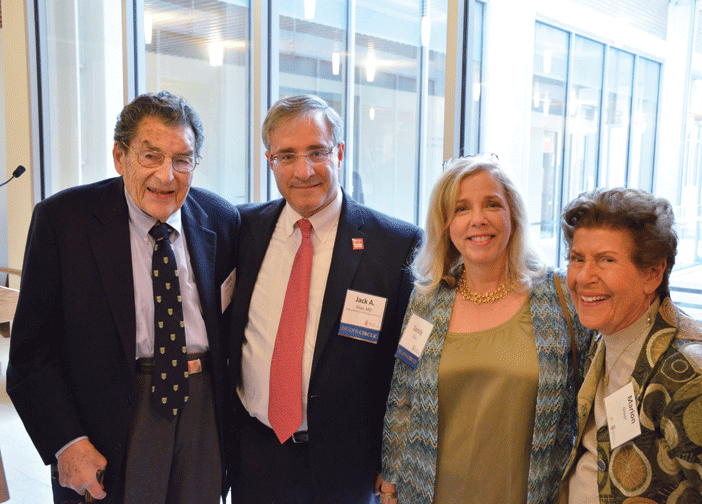David S. Greer, MD, former dean of Alpert Medical School and professor emeritus in the Brown School of Public Health, died November 18, 2014, at his Fall River, MA, home. He was 89.
Greer, a fellow of the Institute of Medicine who was dean of medicine from 1981 to 1992, built a large legacy at Brown, says Jack A. Elias, MD, dean of medicine and biological sciences.
“It is remarkable to consider how many of the initiatives that Dean Greer founded or championed have grown to become fundamental aspects of the Medical School and now the Brown School of Public Health,” Elias wrote in a letter to the Division of Biology and Medicine marking Greer’s death.
Greer founded and chaired the Department of Family Medicine, the Department of Community Health, and the Center for Gerontology and Healthcare Research. He also helped to establish the Center for Alcohol and Addiction Studies and the Program in Liberal Medical Education (PLME).
Stanley Aronson, MD, the Medical School’s founding dean and Greer’s predecessor, says Greer was “a close and faithful friend.” He recalls recruiting Greer, a fellow native of Brooklyn. Greer had been an outstanding medical student at the University of Chicago, where he earned his degree in 1953, Aronson says. He went on to residencies at Chicago and Yale.
“Dave eventually established a practice in Fall River, building a reputation that extended into Rhode Island,” Aronson says. “In 1974, when Brown’s medical school was but two years old, there was a pressing need to recruit someone to organize and manage the many medical disciplines under the title Community Health. We recruited Dave, appointed him as associate dean of medicine, and in his new post he flourished.”
Greer was not only a caring physician and loving husband, father, and grandfather, but also a visionary, says Associate Dean of Medicine Julianne Ip ’75 MD’78 RES’81. He worked with Stephen Smith, MD P’01MD’06 to establish the PLME, a single eight-year course of study leading to a bachelor’s and then a medical degree.
“They viewed medicine as a humanitarian pursuit, not a trade to be learned but a lifelong dedication to patients through compassion—a broad-based education to give context to practice and ongoing learning,” Ip says. “They wanted physicians who would be thoughtful leaders in the community. PLMEs are encouraged to have a strong science background but also to go beyond that to understand the context of medicine: the social, behavioral, economic, cultural, political, religious, and ethical aspects of medicine.”
A Local and Global Activist
Greer was beloved by his patients in Fall River, but he also served the community beyond his own practice. In the late 1960s he helped to establish Fall River’s Highland Heights Apartments, an early public housing facility for the frail, elderly, and others with physical impairments, according to Vince Mor, PhD, professor of health services, policy, and practice. Greer and his late wife, Marion, who died in September 2014, also served as trustees of Bristol Community College in Fall River.
In 1985 Greer became known across the world when, as a founding director of International Physicians for the Prevention of Nuclear War, he shared in the award of the Nobel Peace Prize. In making the award, the Nobel committee wrote that the group, which represents doctors, medical students, and other health workers, “has performed a considerable service to mankind by spreading authoritative information and by creating an awareness of the catastrophic consequences of atomic warfare.”
“A hundred years from now, someone may decide to write a book about Brown’s medical faculty and its outstanding graduates,” Aronson says. “I hope that this historian will remember Dave as one of the pioneers of this academic and health-providing enterprise.”
David Lewis, MD, founding director of the Center for Alcohol and Addiction Studies, says Greer was “a valued friend and mentor.” “His understanding, kindness, and consistent support made it a privilege to work with him,” Lewis says.
Mor recalls how his longtime friend brought him to Brown in 1980 to research hospice care with him. That study led Medicare to establish a palliative care benefit. “This is a guy who taught me so much about what it means to be a leader,” Mor says. “He’s the reason I’m here. …
“He understood what a jewel and wonder it was to be at Brown, but he also knew there’s the hill and there’s the rest of the world,” Mor says. “He was very down to earth. He was a remarkable guy. He was just the best.”




